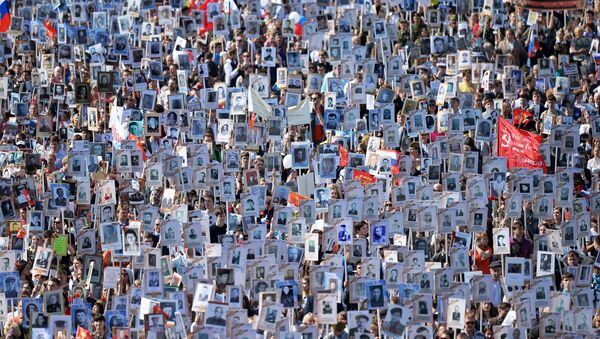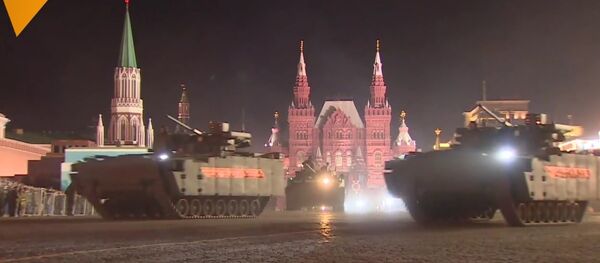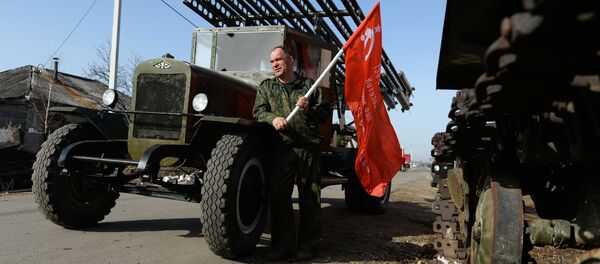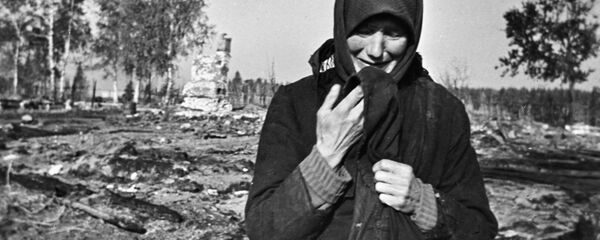According to recent polling by the Russian Public Opinion Research Center (VCIOM), 40% of Russians plan to take part in the Immortal Regiment ceremony on Victory Day, celebrated on May 9 in Russia and across most of the post-Soviet space. 95% of those polled know about the campaign, and among those 96% approve its aims.
But across the Eurasian Economic Union and elsewhere in the former Soviet space things are less clear. Tajikistan, for instance, has prohibited the action, saying that it is against the rules of Islam. However, Russian Islamic leaders have contested the claim. Furthermore, Russia's Northern Caucasus region, home to a Muslim-majorities, expects over 600,000 people to turn out for the commemorative action this year.
Speaking to independent Russian online newspaper Svobodnaya Pressa, political scientist and historian Bogdan Bezpalko, who serves as a member of the Russian Presidential Council on Interethnic Relations, explained why most Russians, and many people across the former Soviet space, support the Immortal Regiment initiative, and why the national elites in some countries oppose it.
As far as Russia is concerned, the expert noted that it was obvious that "for the overwhelming majority of Russian citizens, May 9 remains one of the most important holidays, which they celebrate sincerely, emotionally, with tears in their eyes. This holiday unites the most diverse layers of society. And there is nothing surprising here, given the huge sacrifices by the Soviet and especially the Russian people during the Great Patriotic War, which continue to live on in the memory of new generations."
"As far as the post-Soviet space is concerned, here the situation is more complicated," Bezpalko said. "The elites of almost every republic of the former USSR are trying to destroy our common historical memory, or at least significantly alter it. The memory of the Great Patriotic War, the holiday of May 9, is precisely that factor reminding us of our past unity."
The Ukrainian case is a perfect case study, Bezpalko explained. It's telling, he noted, "that the opening of Eurovision this year, as if by chance, will be held in Kiev on May 9."
And public attitudes toward Victory Day are not homogenous in the post-Soviet space outside Russia, either, the commentator noted. "In the Baltic countries, war has effectively been declared on May 9. The countries' pro-Western elites strive to erase it from peoples' memory – to present these events exclusively as a 'struggle of the Baltic peoples against Soviet occupation'. These countries have marches of SS veterans, something the West closes its eyes to, and this only contributes to the destruction of our common historical memory."
In the case of Ukraine, Bezpalko emphasized that "the effort to displace May 9 has taken a dramatic form only in recent years. As we know, they now celebrate the so-called 'Day of Reconciliation' on May 8, something protested by many Ukrainians." Furthermore, authorities are actively working to displace the memory of the heroism of Ukrainians in the Red Army in favor of groups that actively collaborated with the Nazis.
Bezpalko lamented that while it is true that for now, most Ukrainians still see May 9 positively, if current trends imposed by authorities continue, "the next generation can view this holiday, and the memory of the war, very differently."
In any case, Bezpalko emphasized that as far as Russia was concerned, there is no danger of the Immortal Regiment being forgotten, or turned into any kind of formal, bureaucratic affair. "This idea received such widespread support because it's something that affects almost all of us very deeply: the memory of our ancestors who defended their homeland…And so long as the memory of the heroes in our families lives on, the Immortal regiment will truly remain a people's action."





